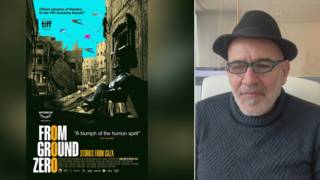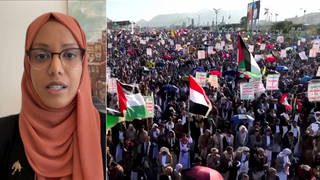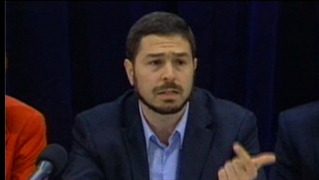
Related
Topics
The Canadian government has acknowledged for the first time that one of the most well-known victims of CIA 'extraordinary rendition' is a completely innocent man. On Monday, a judge concluded a major investigation into the case of Maher Arar. The Syrian-born Canadian was detained nearly four years ago by U.S. authorities at JFK airport and was sent to Syria where he was jailed for a year and repeatedly tortured. We speak with Arar’s attorney, Maria LaHood. [includes rush transcript]
Four years ago this month, a Canadian citizen named Maher Arar was on his way back to Canada from a family vacation in Tunisia. The Syrian-born man had a stopover at JFK airport in New York. The date was September 26, 2002. He wouldn’t see his family for another 374 days.
After being questioned at the airport, U.S. officials took him to an immigration facility in New York. Two weeks later he was secretly flown to Jordan aboard a Gulfstream Jet. Maher Arar ended up in Syria where he was held in a cell, the size of a grave. He was repeatedly tortured. For weeks his family didn’t even know where he was.
On Monday, the Canadian government admitted for the first time that Arar was a completely innocent man. Justice Dennis O’Connor released the findings of a two-year major investigation into the disappearance of Arar. The judge wrote, “I am able to say categorically that there is no evidence to indicate that Mr. Arar has committed any offence or that his activities constituted a threat to the security of Canada.”
The official inquiry said that there is no evidence that Canadian officials played a direct role in his detention or deportation. However Justice O’Connor found that the U.S. government’s decision to send Arar to Syria was likely based on inaccurate and misleading information provided by Canadian authorities. The judge also criticized the Bush administration’s actions. The judge wrote, “They removed him to Syria against his wishes and in the face of his statements that he would be tortured if sent there.”
- Maria LaHood, lawyer for Maher Arar. She is an attorney with the Center for Constitutional Rights.
Transcript
AMY GOODMAN: Maher Arar’s attorney, Maria LaHood, joins us on the phone right now. She’s a lawyer with the Center for Constitutional Rights and she is in Canada. We welcome you to Democracy Now!, Maria LaHood.
MARIA LAHOOD: Thanks, Amy, for having me on.
AMY GOODMAN: It’s good to have you with us. You have spent the last few days with Maher Arar. Can you talk about his reaction to the judge’s finding? And clearly lay out what this report says.
MARIA LAHOOD: Maher is really relieved. He’s certainly happy to have his name finally cleared and to try to move on with his life. The inquiry, as you mentioned, it’s been a two-year process. You know, the judge, commissioner looked at over 20,000 documents. There were over 70 witnesses. There was in-camera testimony. He looked at all of the national security documents. And he basically found that, as you said, there was no evidence implicating Maher in terrorism. There had been a long investigation by law enforcement agencies here, and it actually even continued after Maher got back from Syria, and the investigation included U.S. cooperation. The justice said, the commissioner said that the U.S. never provided Canada with its own information to support that Maher had al-Qaeda ties and that it likely would have given the close cooperation if it had had it.
So all of this incorrect information, this inflammatory information that Canada provided to the U.S. was what was used in the U.S.’s designation of him as an al-Qaeda member and to send him to Syria to be tortured. Some of that information — you know, first of all, the RCMP here gave information to the U.S. saying that Maher and his wife Monia were Islamic extremists with al-Qaeda ties. That was just false. Everyone — I guess every witness that the inquiry interviewed said that that was false and that there was no reason to say that, no basis at all. There was evidence or there was statements given to the U.S. government saying that Maher was in the vicinity of Washington, D.C. on 9/11. That was false. They said that when they requested an interview with Maher, that he refused to be interviewed and suddenly left to Tunisia. That was patently false. So this is the information that the U.S. government used to determine that he was an al-Qaeda member and to send him to Syria to be tortured. And now, this is the information that they claim, I imagine, is a state secret, which prevents him from seeking justice in the United States for what they did to him.
AMY GOODMAN: I first interviewed Maher Arar in 2003. It was November, just a few weeks after he was sent back to Canada from Syria. He described what happened to him there.
MAHER ARAR: Really, I mean, when I arrived there, I just couldn’t believe it. I thought first it was a dream. I was crying all the time. I was disoriented. I wished I had something in my hand to kill myself, because I knew I was going to be tortured, and this was my preoccupation. That’s all I was thinking about when I was on the plane. And I arrived there. I was crying all the time. So, one of them started questioning me, and the others were taking notes. And the first day it was mainly routine questions, between 8 to 12.
And the second day, that’s when the beatings started, because, you know, on the first day they did not find anything strange about what I told them. And they started beating me with a cable, electrical threaded cable, and they would beat me for three, four times. They would stop again, and they would ask questions again, and they always kept telling me, “You are a liar,” and things like that. So, the beating continued for the first two weeks. The most — the most intensive — the intensive beating was really the first week, and then after that it was mostly slapping, punching on the face and kicking.
So, on the third day when they didn’t find anything, third or fourth day, they — in my view, they just wanted to please the Americans, and they had to find something on me. So, because I was accused of being an al-Qaeda member, which is nowadays synonymous with Afghanistan, they told me, “You’ve been to a training camp in Afghanistan.” And I said, “No.” And they started beating me. And I said — well, I had no choice. I just wanted the beating to stop. I said, “Of course, I’ve been to Afghanistan.” I was ready to confess to anything just to stop the torture.
AMY GOODMAN: That was Maher Arar speaking to us in November of 2003 just after he had been released from the Syrian jail and was back in Canada. We spoke to him again just months ago, talking about the psychological effects of that year’s detention. This is Maher Arar again.
MAHER ARAR: I’m completely a different person. I still have fears. I don’t take the plane anymore. I don’t fly. I lost confidence in myself. I feel overwhelmed. My — there is some kind of emotional distancing between me and my kids and my family. They ruined my life. They ruined my life, and I have not been able to find a job. People try to — you know, some people I know, they try to distance themselves from me. It’s — you know, I don’t know how to describe it. I don’t think there is any word I could use to describe what I am going through. And I thought when I came back it would take me a month or two months or a year or two years to get back to normal life. It’s been two years and four months since I came back to Canada, and there are things that are improved a little bit, but I’m still not the same person, and I’m still suffering psychologically.
AMY GOODMAN: That is Maher Arar, speaking to us in February of this year. This is years after his year detention in Syria, after he was tortured. He was sent there through the CIA’s extraordinary rendition, as it is called. Maria LaHood is with us in Ottawa. She has been with Maher Arar. Maria, can you describe what it was like when the judge handed down his findings?
MARIA LAHOOD: Well, it was, you know — these findings are over — it’s three volumes and it’s over 1,200 or almost 1,200 pages. So, you know, we were given the reports to look through. So everyone was furiously trying to look for information. And, you know, we were all thrilled to see that Maher’s name was cleared. There was some information in there that came out that was new information, like this false information that the RCMP gave the U.S. that was really troubling. There was also information that Maher’s — you know, not only Maher’s wife was put on a list, but actually his children were put into intelligence databanks. You know, they are nine and four now. They were one years old and five years old before. And so, it was really troubling to see that, but really quite a relief and exciting to have a public inquiry in this country, to have people applauding Maher for the hero that he is, you know. Today it’s on the front page of all the newspapers. It’s amazing, especially in comparison to what happens in the U.S., where they still claim he’s an al-Qaeda member and won’t let anything be released.
AMY GOODMAN: The Ottawa Citizen reporter Juliet O’Neil, her home was broken into by the authorities in Canada. She was one of those who had reported on what happened to Maher Arar.
MARIA LAHOOD: Right. There was a lot — a big part of the investigation has to do with what happened after Maher got back and the fact that there were government leaks. There was, you know, not only just government incompetence, but what seems to be, you know, an effort to ruin his reputation, to claim he wasn’t tortured, to sort of stain his name. And I think that’s the same thing that’s being done in the U.S., basically. By keeping secrets and saying he’s a member of al-Qaeda, you know, you can cast doubt on the unlawful atrocious behavior of the government. And I think that’s what’s been done.
But now, at least there is a clear record and a clear statement by the commission that Maher has been cleared. I mean, of course, these findings have to be accepted by the Canadian government, along with all the findings. I mean, you know, one of the findings is that the Canadian government should register its objections with the U.S. government for what happened to Maher, for how he was treated, like you said, for the fact they sent him to Syria despite his objection, despite the fact that he said he would be tortured, the fact that the U.S. officials were less than forthcoming with the Canadian officials about what they were going to do. They didn’t let them know that Syria was an option until the day before they sent him. They breached the Vienna conventions on consular relations by not contacting the Canadian consulate for five days. These are all findings in the report.
AMY GOODMAN: And so, what happens now? I mean, you have the judge in the United States, David Trager, who wrote in response to your lawsuit, Maher Arar’s lawsuit here in the United States, he wrote in the judgment, “One need not have much imagination to contemplate the negative effect on our relations with Canada if discovery were to proceed in this case and were it to turn out that certain high Canadian officials had, despite public denials, acquiesced in Arar’s removal to Syria.”
MARIA LAHOOD: Exactly. This commission finding completely alleviates that concern, by finding that Canadian officials were not complicit in Maher’s detention in the United States or in his removal to Syria. I mean, the reason that the judge dismissed this case, he claimed that national security and foreign policy considerations precluded him from holding the federal officials liable, even if what they did violated customary international law and violated our treaties. And what you said, that was one of the reasons, that he was concerned about relations with Canada, because if it came out that Canadian officials were complicit. And this report says they are not complicit. They were not complicit in his rendition to Syria. I mean, I think another —
AMY GOODMAN: Go ahead.
MARIA LAHOOD: Okay. The other — I mean, you know, even after — I mean, we’re appealing the dismissal now on these grounds, and we hope that that will be successful. I mean, we still face the government’s state secrets assertion, which is where they say that the reason they deemed him a member of al-Qaeda is a state secret and the reason we sent him to Syria instead of Canada is a state secret. Well, here, we now know, you know, that it’s very likely that the reason they deemed him an al-Qaeda member is this incorrect information from Canada. And the fact that more information has become public undermines the state secrets privilege, the fact that other governments are investigating this and the U.S. won’t will hopefully put pressure, you know, pressure on the government to actually investigate, pressure to actually disclose information about what happened to Maher.
AMY GOODMAN: And in Canada right now, what about compensation for Maher Arar? His Canadian lawyer, Julian Falconer, saying they’re recommending some kind of compensation and Maher Arar’s separate civil suit against police services and federal agencies. Is the government quietly negotiating with him right now upon the release that completely vindicates him of this report?
MARIA LAHOOD: Well, the commissioner did put in his recommendations that the government should assess Maher’s claim for compensation, in light of his findings, and respond accordingly. So, you know, there will be, I’m sure, some discussions of how that’s going to happen. It hasn’t been decided yet how it will be done.
AMY GOODMAN: And any evaluation going on in the press of how the media was used by the government to smear, to tar Maher Arar?
MARIA LAHOOD: You know, I haven’t seen that, but, you know, it’s a very good point. And I think, you know, there were a lot of people who were complicit in what happened to Maher. It doesn’t just stop with the high government officials. There were people in low-level positions in the INS. There were people in — you know, there were the private jets. There were the people who didn’t get the information out. There were the people who got the misinformation out. And there are people that continue to be complicit in what happened to him. And hopefully, again, the more information that comes out, the more we will find out, and eventually I hope that Maher will be cleared in the U.S., as well.
AMY GOODMAN: Maria LaHood, I want to thank you for joining us from Vancouver. Maria LaHood is the attorney with the Center for Constitutional Rights representing Maher Arar, who has just been completely vindicated by a Canadian report. He had been the subject of what’s called extraordinary rendition by the U.S. government, taken off a plane at Kennedy airport and sent off to Syria where he was tortured. When we come back, we’ll be joined by the president of the Center for Constitutional Rights, Michael Ratner, to talk not only about this case, but what’s going on in Washington, D.C. and the Republican revolt on the issue of torture.












Media Options